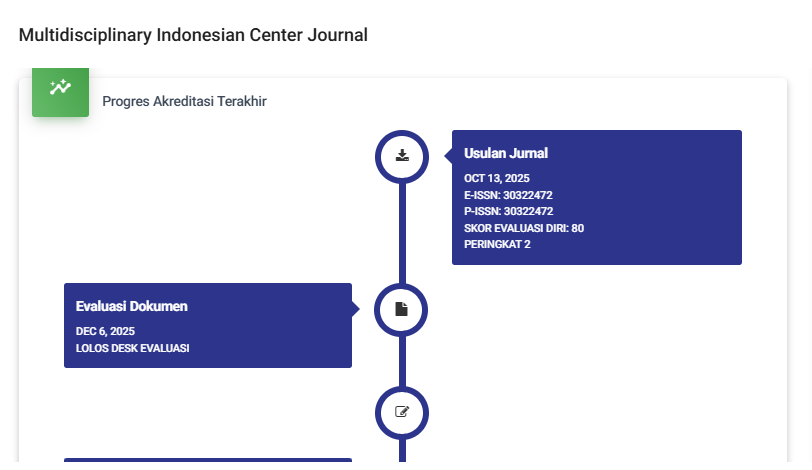FROM STRUCTURE TO REALITY : LAW ENFORCEMENT , INEQUALITY FUNCTIONAL , AND JUSTICE FOR RESIDENT
DOI:
https://doi.org/10.62567/micjo.v2i3.939Keywords:
Inequality law, justice social, education citizenshipAbstract
Study This aiming For analyze inequality between law normative and practical its implementation in system Indonesian law , as well as to study the impact to justice social and awareness law citizens . This article also explores the role of Citizenship Education in to form character critical , fair and conscious citizens law . In the research This the method used is approach qualitative descriptive with type studies library , relying on secondary data from literature academic , documents law , and reports institution independent . The results of the study show that inequality enforcement law due to low integrity institution justice , intervention power , and social bias to group vulnerable . The phenomenon of dualism of law causes law lost universal and changing nature become tool discriminatory power . Therefore that , Citizenship Education own position strategic in to plant mark justice , awareness law , and bias towards groups marginal , in order to create a more society fair and democratic .
Downloads
References
Aristotle. (2009). Nicomachean ethics (W. D. Ross, Trans.; Rev. ed.). Oxford: Oxford University Press. (Original work published ca. 350 B.C.E.)
Asshiddiqie, J. (2009). Hukum tata negara dan pilar-pilar demokrasi. Jakarta: Konstitusi Press.
Banks, J. A. (2008). An introduction to multicultural education (4th ed.). Boston: Pearson Education.
Butt, S. (2010). The Constitutional Court and democracy in Indonesia. Pacific Rim Law & Policy Journal, 19(2), 279–301.
Butt, S., & Lindsey, T. (2008). The constitution of Indonesia: A contextual analysis. Oxford: Hart Publishing.
Butt, S., & Lindsey, T. (2010). Judicial mafia: The courts and state illegality in Indonesia. In T. Lindsey (Ed.), Indonesia: Law and society (2nd ed., pp. 227–243). Sydney: The Federation Press.
Bourne, L. (2017). The Concept of the Rule of Law in Indonesia: Challenges and Opportunities. Jakarta: Indonesia Legal Studies.
Freire, P. (1970). Pedagogy of the oppressed. New York: Continuum.
Hadikusuma, H. (2020). Reformasi pengawasan lembaga penegak hukum di Indonesia. Jurnal Rechtsvinding, 9(2), 201–219. https://doi.org/10.33331/rechtsvinding.v9i2.75
Hadiprayitno, I. (2010). Defensive enforcement: Human rights in Indonesia. Human Rights Review, 11(3), 373–389. https://doi.org/10.1007/s12142-009-0142-4
Hadjon, P. M. (2002). Pengantar hukum administrasi Indonesia. Yogyakarta: Gadjah Mada University Press.
Hadjon, P. M. (2002). Perlindungan hukum bagi rakyat di Indonesia. Surabaya: Bina Ilmu.
Handayani, R., & Diani, R. (2018). Literasi hukum melalui pendidikan nonformal: Studi kasus di komunitas hukum muda. Jurnal Pendidikan dan Kebudayaan, 23(2), 141–150.
Huberman, A. M., & Miles, M. B. (1994). Qualitative data analysis: An expanded sourcebook (2nd ed.). Thousand Oaks, CA: Sage Publications.
ILR (Indonesian Legal Roundtable). (2019). Indeks negara hukum Indonesia 2019. Jakarta: ILR.
Indonesia Corruption Watch (2023). Tren penindakan korupsi di Indonesia. Jakarta: ICW.
Indrayana, D. (2008). Indonesia: Antara negara hukum dan negara mafia hukum. Jakarta: Kompas.
Irianto, S. (2015). Pendidikan Kewarganegaraan: Membangun Kesadaran Hukum dan Demokrasi. Jakarta: Prenadamedia Group.
Kelsen, H. (1934). Pure Theory of Law. University of California Press.
Kementerian Pendidikan dan Kebudayaan. (2016). Permendikbud No. 24 Tahun 2016 tentang kompetensi inti dan kompetensi dasar. Jakarta: Kemendikbud.
Kerr, D. (1999). Citizenship education: An international comparison. International Review of Curriculum and Assessment Frameworks. London: QCA.
Kymlicka, W., & Norman, W. (2000). Citizenship in diverse societies. Oxford: Oxford University Press.
Lindsey, T. (2008). Indonesia: Law and society (2nd ed.). Sydney: The Federation Press.
Luhmann, N. (2004). Law as a Social System. Oxford University Press.
Maftuh, B. (2014). Civic education and the formation of Indonesian civic culture. International Journal of Humanities and Social Science, 4(9), 1–8.
Mahfud MD. (2009). Politik Hukum di Indonesia. Jakarta: LP3ES.
Moleong, L. J. (2017). Metodologi Penelitian Kualitatif (Edisi Revisi). Bandung: Remaja Rosdakarya.
Nurjannah. (2020). Profesionalisme aparat penegak hukum dalam menegakkan keadilan di Indonesia. Jurnal Hukum IUS, 8(2), 227–240. https://doi.org/10.29303/ius.v8i2.615
Nurjannah, R. (2021). Ketimpangan akses keadilan dalam sistem hukum Indonesia: Kajian terhadap kelompok rentan. Indonesia Law Review, 11(2), 145–162. https://doi.org/10.15742/ilrev.v11n2.45
Parsons, T. (1951). The social system. Glencoe, IL: Free Press.
Pompe, S. J. (2005). The Indonesian Supreme Court: A study of institutional collapse. Ithaca, NY: Cornell Southeast Asia Program Publications.
Print, M. (2007). Citizenship Education and Youth in Asia and the Pacific. Springer.
Rahardjo, S. (2006). Hukum progresif: Hukum yang membebaskan. Jakarta: Kompas.
Rahardjo, S. (2009). Biarkan hukum mengalir: Catatan kritis tentang pergulatan manusia dan hukum. Jakarta: Kompas.
Rawls, J. (1971). A theory of justice. Cambridge, MA: Harvard University Press.
Rawls, J. (1971). A Theory of Justice. Harvard University Press.
Rawls, J. (2006). A theory of justice (Revised ed.). Cambridge, MA: Belknap Press of Harvard University Press.
Samsuri, S. (2019). Pendidikan kewarganegaraan dalam perspektif kritis dan relevansinya terhadap demokratisasi hukum di Indonesia. Jurnal Civics: Media Kajian Kewarganegaraan, 16(1), 1–14. https://doi.org/10.21831/civics.v16i1.24071
Santoso, T. (2004). Kriminologi. Jakarta: RajaGrafindo Persada.
Santoso, T. (2016). Kriminologi. Jakarta: Rajawali Pers.
Santos, B. de S. (1995). Toward a new common sense: Law, science and politics in the paradigmatic transition. New York: Routledge.
Sen, A. (2009). The Idea of Justice. Harvard University Press.
Soekanto, S. (1981). Faktor-Faktor yang Mempengaruhi Penegakan Hukum. Jakarta: Rajawali Press.
Soekanto, S. (2006). Faktor-faktor yang mempengaruhi penegakan hukum. Jakarta: Rajawali Press.
Tilaar, H. A. R. (2004). Multikulturalisme: Tantangan-tantangan global masa depan dalam transformasi pendidikan nasional. Jakarta: Grasindo.
Tyler, T. R. (2006). Why People Obey the Law. Princeton University Press.
Wignjosoebroto, S. (2002). Hukum: Paradigma, metode, dan dinamika masalahnya. Jakarta: Elsam & Huma.
Wignjosoebroto, S. (2012). Hukum: Paradigma, metode dan dinamika masalahnya. Jakarta: Elsam.
Winataputra, U. S. (2011). Pendidikan kewarganegaraan dalam perspektif filsafat kewarganegaraan. Jakarta: Universitas Terbuka.
Winataputra, U. S. (2012). Civic disposition sebagai ciri kewarganegaraan demokratis: Reaktualisasi tujuan pendidikan kewarganegaraan. Jurnal Pendidikan Kewarganegaraan, 12(1), 1–15.
World Justice Project (2023). Rule of law index 2023. Retrieved from https://worldjusticeproject.org
Yudistira, R. A., & Budimansyah, D. (2021). Pemahaman mahasiswa terhadap supremasi hukum dalam pendidikan kewarganegaraan. Jurnal Civicus, 9(1), 55–64.
Downloads
Published
How to Cite
Issue
Section
License
Copyright (c) 2025 Irfandi

This work is licensed under a Creative Commons Attribution-ShareAlike 4.0 International License.



























